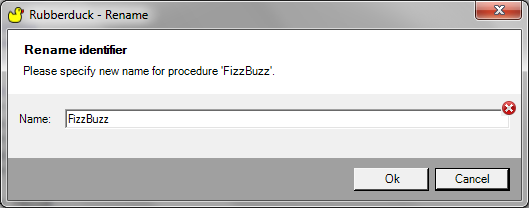Knowing who's using what, and where, I've implemented a "Rename" refactoring for Rubberduck.

It works great - it needs further extensive testing, but the preliminary tests are very, very exciting.
There are a few things I'm not sure I like though:
- The entire logic is implemented in the
Rubberduck.UInamespace. The "Extract Method" refactoring logic is also implemented under that namespace (underRubberduck.UI.Refactorings.ExtractMethod) - I think I might be violating SRP with these presenter classes, but I'm not sure it's worth the trouble. Any thoughts? - I don't know whether/how it's possible to actually replace tokens in the parse tree, so the renaming actually boils down to a very very localized search & replace... and the implementation is ugly beyond words - and I'm not sure how to go about making it right.
- The code acquiring the target identifier looks like it could get cleaner... but how?
namespace Rubberduck.UI.Refactorings.Rename
{
public class RenamePresenter
{
private readonly VBE _vbe;
private readonly IRenameView _view;
private readonly Declarations _declarations;
private readonly QualifiedSelection _selection;
public RenamePresenter(VBE vbe, IRenameView view, Declarations declarations, QualifiedSelection selection)
{
_vbe = vbe;
_view = view;
_view.OkButtonClicked += OnOkButtonClicked;
_declarations = declarations;
_selection = selection;
}
public void Show()
{
AcquireTarget(_selection);
_view.ShowDialog();
}
private static readonly DeclarationType[] ModuleDeclarationTypes =
{
DeclarationType.Class,
DeclarationType.Module
};
private void OnOkButtonClicked(object sender, EventArgs e)
{
if (ModuleDeclarationTypes.Contains(_view.Target.DeclarationType))
{
RenameModule();
}
else
{
RenameDeclaration();
}
RenameUsages();
}
private void RenameModule()
{
try
{
var module = _vbe.FindCodeModules(_view.Target.QualifiedName.QualifiedModuleName).Single();
module.Name = _view.NewName;
}
catch (COMException exception)
{
MessageBox.Show(RubberduckUI.RenameDialog_ModuleRenameError, RubberduckUI.RenameDialog_Caption);
}
}
private void RenameDeclaration()
{
var module = _vbe.FindCodeModules(_view.Target.QualifiedName.QualifiedModuleName).First();
var content = module.get_Lines(_view.Target.Selection.StartLine, 1);
var newContent = GetReplacementLine(content, _view.Target.IdentifierName, _view.NewName);
module.ReplaceLine(_view.Target.Selection.StartLine, newContent);
}
private void RenameUsages()
{
var modules = _view.Target.References.GroupBy(r => r.QualifiedModuleName);
foreach (var grouping in modules)
{
var module = _vbe.FindCodeModules(grouping.Key).First();
foreach (var line in grouping.GroupBy(reference => reference.Selection.StartLine))
{
var content = module.get_Lines(line.Key, 1);
var newContent = GetReplacementLine(content, _view.Target.IdentifierName, _view.NewName);
module.ReplaceLine(line.Key, newContent);
}
}
}
private string GetReplacementLine(string content, string target, string newName)
{
// until we figure out how to replace actual tokens,
// this is going to have to be done the ugly way...
// what we're trying to avoid here,
// is to replace all instances of "Foo" in "Foo = FooBar" when target is "Foo".
var result = ' ' + content;
if (result.Contains(' ' + target))
{
result = result.Replace(' ' + target, ' ' + newName);
}
if (result.Contains(target + ' '))
{
result = result.Replace(target + ' ', newName + ' ');
}
if (result.Contains(target + '.'))
{
result = result.Replace(target + '.', newName + '.');
}
else if (result.Contains('.' + target))
{
result = result.Replace('.' + target, '.'+ newName);
}
if (result.Contains('(' + target))
{
result = result.Replace('(' + target, '(' + newName);
}
if (result.Contains(":=" + target))
{
result = result.Replace(":=" + target, ":=" + newName);
}
if (result.Contains(target + '!'))
{
result = result.Replace(target + '!', newName + '!');
}
else if (result.Contains('!' + target))
{
result = result.Replace('!' + target, '!' + newName);
}
return result.Substring(1);
}
private static readonly DeclarationType[] ProcedureDeclarationTypes =
{
DeclarationType.Procedure,
DeclarationType.Function,
DeclarationType.PropertyGet,
DeclarationType.PropertyLet,
DeclarationType.PropertySet
};
private void AcquireTarget(QualifiedSelection selection)
{
var targets = _declarations.Items.Where(declaration =>
declaration.QualifiedName.QualifiedModuleName == selection.QualifiedName
&& (declaration.Selection.Contains(selection.Selection))
|| declaration.References.Any(r => r.Selection.Contains(selection.Selection)))
.ToList();
var nonProcTarget = targets.Where(t => !ProcedureDeclarationTypes.Contains(t.DeclarationType)).ToList();
if (nonProcTarget.Any())
{
_view.Target = nonProcTarget.First();
}
else
{
_view.Target = targets.FirstOrDefault();
}
if (_view.Target == null)
{
// no valid selection? no problem - let's rename the module:
_view.Target = _declarations.Items.SingleOrDefault(declaration =>
declaration.QualifiedName.QualifiedModuleName == selection.QualifiedName
&& ModuleDeclarationTypes.Contains(declaration.DeclarationType));
}
}
}
}
I definitely need a different approach for the GetReplacementLine method; I thought of using regex, but I'd rather not. Or should I? Are there other alternatives?
I've tagged this with antlr because my Declaration object does expose a RuleContext object that I'm just not using here... anyone familiar with ANTLR knows if there's something I should know that would make my life easier here?
